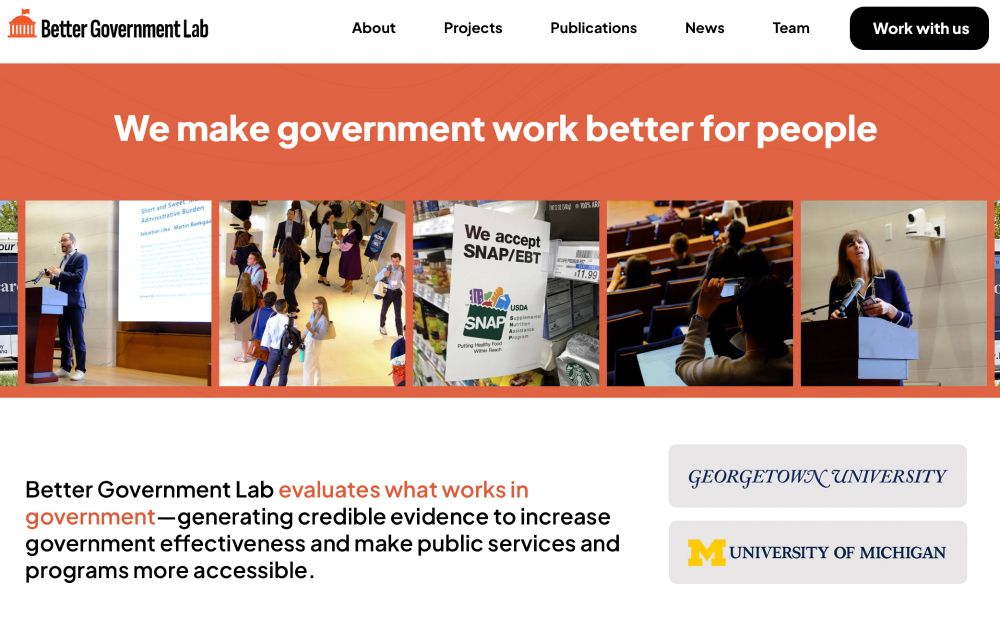http://www.sebastianjilke.net
https://www.bettergovernmentlab.org
www.bettergovernmentlab.org
You can now follow us on LinkedIn --> www.linkedin.com/company/bett...
@pamherd.bsky.social @donmoyn.bsky.social @jbarofsky.bsky.social @giannella.bsky.social

www.bettergovernmentlab.org
You can now follow us on LinkedIn --> www.linkedin.com/company/bett...
@pamherd.bsky.social @donmoyn.bsky.social @jbarofsky.bsky.social @giannella.bsky.social


The 🥯is rolling…
@donmoyn.bsky.social @giannella.bsky.social @pamherd.bsky.social @jaeyeonkim.bsky.social @jbarofsky.bsky.social

The 🥯is rolling…
@donmoyn.bsky.social @giannella.bsky.social @pamherd.bsky.social @jaeyeonkim.bsky.social @jbarofsky.bsky.social


-Cohabitants of individuals who received incentives were 0.3 percentage points LESS likely to get a booster!
(10/16)

-Cohabitants of individuals who received incentives were 0.3 percentage points LESS likely to get a booster!
(10/16)
(9/16)

(9/16)
-All ~40,000 residents (in 10,000 households) of Ravensburg, Germany were mailed letters with information abt four upcoming, public vax events
(8/16)

-All ~40,000 residents (in 10,000 households) of Ravensburg, Germany were mailed letters with information abt four upcoming, public vax events
(8/16)
(4/16)

(4/16)
@johnt1.bsky.social Florian Keppeler @dominikvogel.bsky.social
“Scaling Behavioral Interventions in the Presence of Spillover: Implications for Evidence-Based Policy Making”
osf.io/k5uap/
PAsky polisky econsky policysky scipol science4policy
/Thread


@johnt1.bsky.social Florian Keppeler @dominikvogel.bsky.social
“Scaling Behavioral Interventions in the Presence of Spillover: Implications for Evidence-Based Policy Making”
osf.io/k5uap/
PAsky polisky econsky policysky scipol science4policy
/Thread
WHY?
We suspect one problem is a lack of policy education about the potential pitfalls of financial incentives. For instance, when it comes to degrees typically pursued by German policy makers:

WHY?
We suspect one problem is a lack of policy education about the potential pitfalls of financial incentives. For instance, when it comes to degrees typically pursued by German policy makers:
- Prediction: Mean of 15pp; over 80% expected a positive effect
- RCT: Precise null

- Prediction: Mean of 15pp; over 80% expected a positive effect
- RCT: Precise null
One member per 5,016 households randomly selected to receive 20 (+20) Euros incentive, or not.
(Designed to measure spillovers... more on this in an upcoming thread.)

One member per 5,016 households randomly selected to receive 20 (+20) Euros incentive, or not.
(Designed to measure spillovers... more on this in an upcoming thread.)
Here are the materials they evaluated (and which we also used in the RCT):

Here are the materials they evaluated (and which we also used in the RCT):

-Prediction study among local policy-makers (mayors, etc.) evaluated same materials in RCT testing whether financial incentives increase vaccination
-Policy-makers predicted 15pp increase, BUT the RCT found a precise null
-We discuss why, and what to do about it

-Prediction study among local policy-makers (mayors, etc.) evaluated same materials in RCT testing whether financial incentives increase vaccination
-Policy-makers predicted 15pp increase, BUT the RCT found a precise null
-We discuss why, and what to do about it
osf.io/jq28n
“Policy makers believe money motivates more than it does”
With Flo Keppeler, John Ternvoski, Dominik Vogel & Erez Yoeli
/Thread 🧵

osf.io/jq28n
“Policy makers believe money motivates more than it does”
With Flo Keppeler, John Ternvoski, Dominik Vogel & Erez Yoeli
/Thread 🧵

